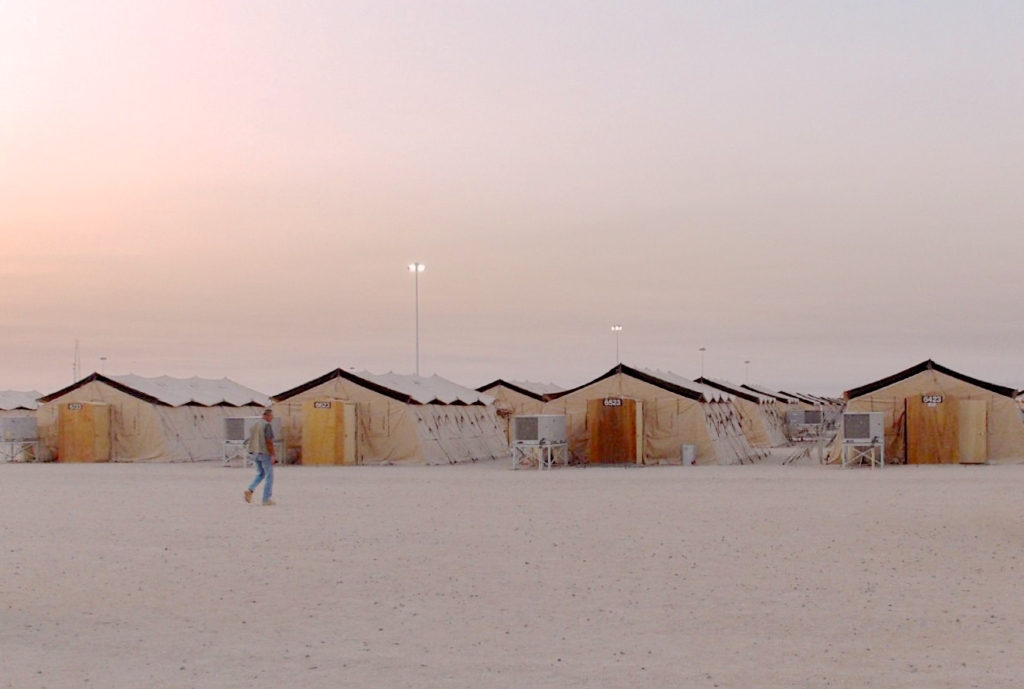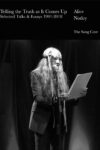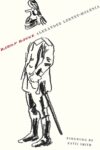I had been to a few funerals as a child. They were always for elderly relatives, because death had come at its appointed time and had not strayed beyond the few members of my tribe who were partitioned off by advanced age. You got old and became a grandparent and died. And when you died, you smelled powdery and had paper-thin skin. You were laid out in your wedding clothes and buried in the Veterans Cemetery, completing an odd kind of nostalgic circuit where, instead of glowing, the bulb flickered out.
The first death I encountered that didn’t fit the pattern I’d known from childhood was in Iraq. I was 22 years old, an infantryman with the American army, and I had been in Baghdad on my first deployment for only a few weeks. Our convoy moved through narrow, old streets, nearly slowing to a stop to negotiate abrupt turns. Buildings felt like they were shaking around us. I was sitting in a Humvee turret, behind a B-240 machine gun. Because of my position in the convoy, I was tasked with watching the rooftops for snipers. But things felt calm above us. People hung laundry, smoked cigarettes, and looked through us with a forced nonchalance as we passed. Pigeons squabbled mid-flight in a hot, cloudless sky.
I didn’t immediately notice when our convoy began following children. A group of maybe ten elementary-aged kids were laughing around us, smiling, asking for chocolates, and pointing us on towards something. They eventually led us to what I remember as a dead end street, but I don’t completely trust that it was. The metaphor seems too pat. In the street, closer to one curb than the other, was a bound corpse that had obviously been tortured.
Any description of a mangled, dead body is necessarily obscene. Dressing the wounds up in colorful language, describing what I saw as something akin to St. Sebastian with the arrows removed, drill holes still oozing singed fat, seems cheap. Almost immorally so. But it would be just as bad to underplay the scene by being taciturn, to leave the body to the imagination, and to simply say that the children continued dancing, smiling, and crying out for treats as their reward for leading us to the corpse. That seems equally barbaric, for silence can sometimes be as melodramatic as shouting. There really is no appropriate way to describe an abomination. The cruelty of the actual event infects and dilutes any rendering. Direct access is blocked off and we’re left meandering around the perimeter of violence, gawking. Always gauche, but better than ignoring it altogether.
People smoked cigarettes and stared at us from shadowed doorways. There were dogs around, but the heat pinned them down to the street, panting and watching. The body, which had most likely been tortured to death as part of the Shia purge of Sunnis from the neighborhood, was transported to an Iraqi police station. I was never on that street again.
But I had seen him, and I don’t just mean literally. I would go on during the rest of that first deployment, and through my second, to see acts of violence and evidence of violence frequently and in quick succession. I would even participate in them directly. But all my subsequent experiences became condensed into a single symbol in that first encounter with the dead man in Baghdad. I had seen the body with the kind of eyes that Joseph Pieper meant when he wrote about vision, “that primordial and basic mental grasping of reality, which constitutes the essence of man as a spiritual being.” It would take years for me to finally accept that my reaction to violence was a spiritual reaction.
We could buy things off the Internet during the war, and I chose to buy books. I got a big plastic trunk and began to fill it with used copies of whatever I could find for less than $5. At first I grazed, unsure where to direct my attention, buying contemporary novels, science fiction, and biographies. Then I tripped over Ezra Pound. His work splashed in me like heavy machinery collapsing into a quarry lake. I knew that he had fascist inclinations, but I just chalked them up to his pushing against capitalism too hard and in the wrong direction. And besides, his early work didn’t yet show the pedantic symptoms of fascismo italiano. His poesy was a clenched fist, taut with simplicity and elegantly powerful.
Pound lead me to the Provençal troubadour poets, to Li Po, and to Catullus. What was important about all this reading was that it was happening in between missions and occasional, sometimes shockingly casual, violence — as well as hard physical labor. My reading had become directed and there was a definite intent behind it, but it wasn’t academic. I wasn’t interested in ideas as baubles or language as a fetish. My reading was more like nourishment and it was emotionally charged with the sense that it was essential. Showering, eating, sleeping, keeping my weapon clean, keeping my eyes open, reading Pound — these things formed my matrix of activity, and I had little energy for anything else. The books I was reading had to be more than scholarly critical tools or clever ways to kill time. They had to exhibit a concern with how to live well, especially through pain and discomfort. They had to give instructions on how to thrive as a human in a severe environment. It was a very specific education that I was giving myself, but more of life has always occurred in squalor than in the schoolroom. This is how I found Stoicism.
Maxwell Staniforth’s introduction to the Penguin Classics edition of Marcus Aurelius’ Meditations describes the movement of Stoicism from Greek to Roman minds as a translation from a philosophical school to something more like a moral code: “A code which was manly, rational, temperate, a code which insisted on just and virtuous dealing, self-discipline, unflinching fortitude, and complete freedom from the storms of passion.” There was a striking parallel between the ‘common place’ book of Marcus Aurelius — composed of casual thoughts captured in a daily journal during the tumult of war and governance — and the context that my own situation provided. His terse prose, delivered in a pragmatic staccato, might have been composed in the saddle. And I was reading them during the few moments I could find between missions. Though we were separated by time and rank, I responded to the immediacy of Aurelius’ thoughts, assembled in urgent and fleeting moments.
The lineage of Stoicism doesn’t begin with warrior kings. It comes embedded with an epistemology that was first developed by the Cynic, Zeno, on his painted porch — the eponymous Stoa Poikile. By the time the Romans got their hands on Stoicism it had become a palimpsest . Well-developed Greek thinking on the nature of appearance, modes of virtue, and prepositional logic shown through the Roman version of Stoicism in vague, washed out impressions. I gravitated toward the Romans, because like me they were part of an imperial project, their lives shaped by violence and logistics. My experience was more like theirs, and I was simply more like them. I didn’t have a painted porch. I had body armor, gun and flag.
And so Aurelius helped me through the violence. Some of his maxims read more like exercises that I could perform. One of his more renowned exercises reads:
Begin each day by telling yourself: Today I shall be meeting with interference, ingratitude, insolence, disloyalty, ill-will, and selfishness — all of them due to the offender’s ignorance of what is good or evil.
Also:
Hour by hour resolve firmly, like a Roman and a man, to do what comes to hand with correct and natural dignity, and with humanity, independence, and justice. Allow your mind freedom from all other considerations. This you can do, if you approach each action as though it were your last, dismissing the wayward thought, the emotional recoil from the command of reason, the desire to create an impression, the admiration of self, the discontent with your lot. See how little a man needs to master, for his days to flow on in quietness and piety: he has but to observe these few councils, and the gods will ask for nothing more.
This rehearsal to stave off distressing thoughts, praemeditatio futurorum malorum, is a fairly ubiquitous Hellenistic self-help technique. Cicero too mentioned how anticipating potential troubles is better than being caught off guard. Being able to dismiss “emotional recoil” during combat is highly desirable, and whittling down your expectations is a shockingly pragmatic way to accomplish such a dismissal. I began tailoring the meditations to my own life, adding details particular to my situation, personalizing them. “Tonight I will see animals eating the dead, but it has nothing to do with me or my mission, and I’ll take pride in doing my duty instead of feeling disgust at things outside of my control.” Because that’s what Stoicism is best at: shrinking the perimeter around what you feel responsible for, calming the passions, and working towards apatheia, the tranquility of a mind liberated from suffering.
Seneca, writing a bit before Aurelius, said, “We are all chained to Fortune.” Amor Fati, embracing your fate, was another important element of building a mind untormented by the vagaries of life. Seneca also said:
What we receive is perishable, and we shall ourselves perish. Why then are we indignant? Why do we complain? It is for this we were born. Nature may use her own bodies as she will; we must be cheerful and steadfast whatever befalls, in the thought that nothing that is ours is lost. What is the duty of a good man? To offer himself to fate.
Returning to base from a mission, stiff with exhaustion and sweat, I would flip through the Stoics with nicotine stained fingers. They eased my suffering. They calmed the existential hum that is amplified by violence, trauma, squalor, and brief moments of exaltation in alien worlds. But what I didn’t know then, and what I hadn’t anticipated with the Stoics, is that war is much longer than a deployment. It isn’t always the future Fati that we need to arm ourselves against — or resign ourselves to. Most of the war comes after the war. Waves reverberate from a single point for an entire lifetime, rocking you. After a certain point it wasn’t an acceptance of the future that I needed to steel myself against; it was a reckoning with the past.
I had seen terrible things done, and done them myself in turn. None of them felt necessary. The entire imperial enterprise didn’t seem necessary. And like in Robert Bly’s poem about the “drop of Indian blood preserved in snow” beneath the cement of the Pentagon, the image of the body I’d seen during my first deployment was preserved in me. It refuted the ancient arguments, thwarted my attempts to bury the specter of violence under a veneer of staid rationalism.
I got out of the Army and moved to Brooklyn. You could say that once I had tried Stoicism, I wanted to give Epicureanism a shot. Things seemed fine for a while. But trauma doesn’t move in a straight line, as the crow flies. It finds odd, byzantine paths to return back to you. There was no simple correlation for me between violence and the word violence. If anything, language itself was a cudgel to hide behind. I could tell my story, if people were willing to listen, and feel fine about it afterwards. But the hum of an air conditioner would bring me to tears. The sad mood of the day might leave me paralyzed on my couch for hours. The trauma had gotten bored coming in through the front door and had instead snuck in through a low basement window. A trigger warning would have been impossible to implement. The enemy was hiding in a restaurant menu, my knuckles, a website, the memory of a lost childhood weekend with my parents. I would open the fridge and smell the corpse. I would turn on the radio and hear the corpse singing.
The Catholic writer G.K. Chesterton, a bit harsh on Marcus Aurelius, says of the later Stoics:
Their dignity, their wariness, their sad external care for others, their incurable internal care for themselves, were all due to the Inner Light, and existed only by that dismal illumination. Notice that Marcus Aurelius insists, as such introspective moralists always do, upon small things left done or undone; it is because he has not hate or love enough to make up a moral revolution. He gets up early in the morning, just as our own aristocrats living the Simple Life get up early in the morning; because such altruism is easier than stopping the games at the amphitheater or giving the English people back their land.
It’s the same tiny stage on which the Stoic perfects the small tasks of the day that he also super-rationally accepts his fate. That path seemed narrow and interminable now. I didn’t want to accept the corpse I’d seen as inevitable. It seemed important that, however irrational or romantic it might be, I refuse to accept it. A deeper and more comprehensive morality should be invested in changing fate, not surrendering to fatalism; or at the very least it should nurse a hatred of the arbitrary injustices of fate. Morbid passion, an unfathomable sorrow, wasn’t an obstacle to be overcome — it was the appropriate response to confronting a tortured, mutilated human. Stoicism functioned well during times of action, but reconciling memory and moral imagination require something transcendental. I longed for something simultaneously more radical and more essential than Stoicism. I still do.
Years later I found a book written by the French Christian mystic Simone Weil called War and the Iliad. The book cuts deeply to the very real metaphysical issue with violence — witnessing it, having it inflicted on you, and inflicting it yourself. Weil writes, “Force is as pitiless to the man who possesses it, or thinks he does, as it is to the victims; the second it crushes, the first it intoxicates. The truth is, nobody really possesses it.” The Stoic illusion of self-mastery revealed itself as an evasion of the truth, which is that when the warrior attains apatheia he makes himself into a more efficient conduit to transmit even more violence.
As I get older, so does the war. Its reverberations echo outward, fainter, but wider in scope. And I keep learning from it. I accept being haunted by the corpse. And that acceptance is really a sort of rejection of the rule of force. It’s an anti-apatheia. Of course it’s irrational, but that’s its strength. Weil describes the “natural” as the rule of power, of greater force always winning out. The “supernatural” behaves “as though there were equality when one is stronger in an unequal relationship.” Nature is morally arbitrary physical force. The Supernatural is physically arbitrary moral force. Nature is dehumanizing, making us into commodities or corpses. The supernatural does the opposite.
If I were to create a morning exercise to recite in the manner of Aurelius today, it would be almost to the opposite ends. It would be a reminder to remain disturbed. I would implicate myself in the sorrows of the world. I would remind myself that though my responsibilities are vast, I’m not alone. It would sound less like a self-help mantra and more like a prayer.
Scott Beauchamp is a writer living in Portland, Maine. His work has appeared in The Paris Review, The Baffler, Bookforum, and The Washington Post, among other places.
Image source here.
This post may contain affiliate links.








